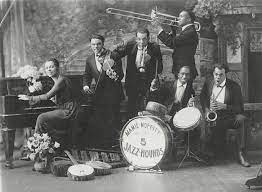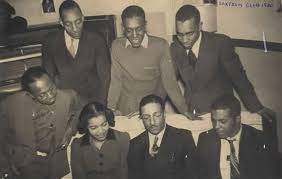
My small corner of the world has been buzzing with Worcester jazz lore this week, so it feels like a propitious time to introduce you to the Jazz History Database. This archive of Worcester-related jazz materials is a cooperative enterprise of Worcester Polytechnic Institute (WPI) and the Massachusetts Association of Jazz Educators, and an impressive model for the kind of grass roots efforts that communities elsewhere might undertake to preserve their own jazz histories. It was established in 2001 by Rich Falco, who’s been the Director of Jazz Studies at WPI since 1978.
Falco told me today that it was his interest in documenting the background of Jaki Byard that spurred him to begin the database. Byard, born in 1922, is the most acclaimed and influential jazz musician to have come out of Worcester. Following service in World War II, he worked with saxophonist Earl Bostic, whom he met in his Army unit, then was a fixture on Boston’s dynamic jazz scene through the late ’50’s. Associations with Maynard Ferguson, Charles Mingus, and Eric Dolphy brought him to greater prominence in the ’60’s, and by 1969 he began a dual career as a Professor of Music at the New England Conservatory and the Manhattan School of Music. Byard’s encyclopedic knowledge of jazz piano styles fueled what many saw as an oddly unorthodox approach during a period of bebop uniformity, but it made him a prime model for the post-modern eclecticism that has characterized jazz for the past few decades. Jaki’s many proteges include Jason Moran, the pianist who recently succeeded Billy Taylor as Jazz Advisor to the Kennedy Center for the Performing Arts.
“I was researching Jaki Byard’s roots in Worcester,” Falco recalled. “You know, no one just falls from the sky. I knew that Jaki was mentored by people locally, that he’d played with the Nighthawks, and that his father played with Mamie Moffitt as early as 1924. Jaki was a teenager when the Saxtrum Club [a cooperative founded in 1938] was formed, and it played a formative role in his development. But when I started to look into this and found only one picture of Mamie and one of the interior of the Saxtrum, I got anxious that this was history that was slipping right through our fingers.”

So Falco and Chet Williamson, a Worcester-based musician and journalist, began unearthing everything they could find in the way of photos, recordings, news clippings, handbills, and stories about jazz in Worcester and Central Massachusetts. Williamson calls the site “a living museum,” which is dedicated to recording oral histories and preserving as much primary source material as possible on “not just the central characters, but peripheral players as well.” A parallel undertaking of Williamson’s is The Jazz Worcester Real Book, which he co-authored with pianist Dick Odgren. Published in 2003, it contains profiles of nearly 100 musicians and sheet music for dozens of original tunes.
What sent me to the Jazz History Database this week was a JazzWax blog devoted to Boots Mussulli. JazzWax writer Marc Myers, who’s based in New York, got the New Year under way with a feature on Milford native Mussulli, the legendary saxophonist who toured with Stan Kenton and recorded in the mid-‘50’s with Boston-based colleagues Serge Chaloff, Herb Pomeroy, and Richard Twardzik. I’ve been familiar with the Mussulli legend for as long as I’ve been interested in jazz, and credit drummer Bobby Gould with introducing me to Boots’s music when I was a teenager. I wrote of a humorous Mussulli-related anecdote on this Phil Woods feature two months ago.
When I contacted Myers about his Boots blog, he asked me if I knew of any tapes that were made of Mussulli at the Crystal Ballroom, the nightclub at the Italian-American Social Club in Milford. Boots not only played there regularly in the ‘50s and ‘60s, but also booked such luminaries as Charlie Parker, Count Basie, and Joe Williams. As it happened, I didn’t know of anything from the Crystal, but I recalled reading about a tape of Boots at the Fox Lounge in Westborough that Williamson reported on a few years ago for his blog, Jazzsphere.
As if that weren’t enough buzz for one week, Falco called this evening to say that he gave a presentation on the Jazz History Database at the Jazz Education Network conference in Louisville this morning. In discussing the importance of documenting what he calls the “regional dialects of jazz” through archives such as WPI’s, he related his own experience as a student at Berklee in 1971. “At the time, you could still tell a cat from Philly or New Orleans based on their sound. But now, partly through the standardized approach that formal education requires, there’s a homogenization process underway that threatens these regional styles.”
Falco says that when he first presented on the database at a jazz convention several years ago, people couldn’t get their minds around the digital technology that makes an internet resource like this possible. But what a difference a few short years makes. “I never anticipated the kind of response I got today,” he says. “There are three or four institutions in the U.S., and a couple in Canada, that expressed strong interest in joining as satellite collection centers. And a couple of Europeans expressed interest too. People are recognizing that if we don’t salvage what’s still around, it’ll be gone forever.”
Through Falco’s office and the ongoing efforts of undergraduate techies at WPI, the Jazz History Database has established collections on Worcester jazz legends Howard Jefferson, Barney Price, and Reggie Walley, as well as players who went on to national renown: Wendell Culley, Barbara Carroll, Frankie Capp, Don Fagerquist, and Tony Zano. There’s an archive of recordings from WCUW’s jazz series, including a solo concert by Max Roach that I produced in 1979; dozens of jazz performances from the Studio 3 television shows hosted by Toni Ballard; and WICN’s Jazz New England performance series. And right in synch with Marc Myers’ query, Falco reports that a new collection of Boots Mussulli material, including tapes from the Crystal Ballroom, will become available by the end of this month.
I’ll have more to report about Worcester’s jazz history in the coming months. Meanwhile, there’s a treasure trove of material right here at your fingertips.